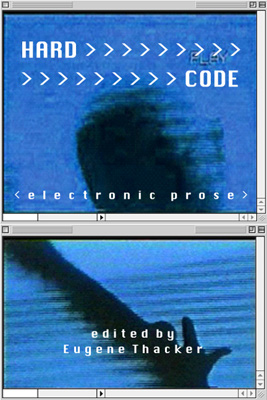Eugene Thacker (ed.): Hard_code: Narrating the Network Society (2001)
Filed under book | Tags: · code poetry, network society

“HARD_CODE is an anthology of experimental electronic prose which asks the question: What kinds of stories are told by data? The texts in this anthology respond to this question from a wide range of viewpoints, often suggesting that the dynamics between bodies and data is not always a smooth one. Filled with identity avatars, DNA bodies, generative code, and virtual realities, HARD_CODE combines leading-edge work from new media art/net.art, cultural theory, and experimental fiction, forming new hybrids between flesh and data.
HARD_CODE brings together a group of innovative writers exploring the syntax of new media and computer technologies. From net.artists, to science fiction writers, to computer hackers, to practitioners of ‘degenerative prose,’ HARD_CODE is a ‘mis-users manual’ for the network society.”
Contributors include: Doll Yoko, Fakeshop, Matthew Fuller, Shelley Jackson, Harold Jaffe, ID_Runners, MEZ, Andi and Lance Olsen, Doug Rice, Steven Shaviro, Julia Solis, Alan Sondheim, Steve Tomasula, Don Webb, and many others…
Publisher Alt-X Press, 2001
ISBN 1931560048, 9781931560047
211 pages
PDF, PDF (updated on 2017-6-26)
Comment (0)Jodi Dean, Jon W. Anderson, Geert Lovink (eds.): Reformatting Politics: Information Technology and Global Civil Society (2006)
Filed under book | Tags: · civil society, ict, information society, internet governance, network society, politics, publishing

“Reformatting Politics examines the ways in which new information and communication technologies (ICTs) are being used by civil society organizations (CSOs) to achieve their aims through activities and networks that cross national borders. These new ICTs–the internet, mobile phones, satellite radio and television–have allowed these civil society organizations to form extensive networks linking the local and the global in new ways and to flourish internationally in ways that were not possible without them.
The book consists of four sections containing essays by some of the top scholars and activists working at the intersections of networked societies, civil society organizations, and information technology. The book also includes a section that takes a critical look at the UN World Summit of Information Society and the role that global governance has played and will play in the use and dissemination of these new technologies. Finally, the book aims to influence this important and emerging field of inquiry by posing a set of questions and directions for future research. In sum, Reformatting Politics is a fresh look at the way critical network practice through the use of information technology is reformatting the terms and terrains of global politics.”
Publisher CRC Press, 2006
ISBN 0415952980, 9780415952989
237 pages
Key terms: ICANN, weblogs, Islamic fundamentalism, mobile phone, Suharto, MacBride Report, Internet governance, WSIS, Indymedia, CSOs, neoliberal, NWICO, power law, Taliban, Information Society, open publishing, ICTs, BitTorrent, Laskar Jihad, microfinance
Review: Athina Karatzogianni.
PDF (updated on 2018-10-24)
Comment (0)Connected, or, What it means to live in the network society
Filed under book | Tags: · network culture, network society
In the twenty-first century, a network society is emerging. Fragmented, visually saturated, characterized by rapid technological change and constant social upheavals, it is dizzying, excessive, and sometimes surreal. In this breathtaking work, Steven Shaviro investigates popular culture, new technologies, political change, and community disruption and concludes that science fiction and social reality have become virtually indistinguishable. Connected is made up of a series of mini-essays–on cyberpunk, hip-hop, film noir, Web surfing, greed, electronic surveillance, pervasive multimedia, psychedelic drugs, artificial intelligence, evolutionary psychology, and the architecture of Frank Gehry, among other topics. Shaviro argues that our strange new world is increasingly being transformed in ways, and by devices, that seem to come out of the pages of science fiction, even while the world itself is becoming a futuristic landscape. The result is that science fiction provides the most useful social theory, the only form that manages to be as radical as reality itself. Connected looks at how our networked environment has manifested itself in the work of J. G. Ballard, William S. Burroughs, Philip K. Dick, William Gibson, K. W. Jeter, and others. Shaviro focuses on science fiction not only as a form of cultural commentary but also as a prescient forum in which to explore the forces that are morphing our world into a sort of virtual reality game. Original and compelling, Connected shows how the continual experimentation of science fiction, like science and technology themselves, conjures the invisible social and economic forces that surround us. One of our most exciting thinkers explores thelook and feel of our cultural moment.
Connected, or, What it means to live in the network society
By Steven Shaviro
Published by U of Minnesota Press, 2003
ISBN 0816643636, 9780816643639
289 pages
Review (Kathleen Fitzpatrick), Review (Jarice Hanson), Review (Meredith Tromble)
Comment (0)
